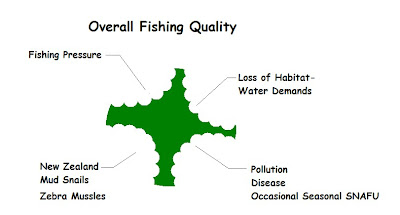These invasive aquatic species take a bite out of the ecosystem by removing plankton and other organic material that is crucial for native species to thrive. These invasive aquatic species will have no natural predators in most cases and breed like crazy. Once they get into the system it is almost impossible to get them out. As the numbers multiply and the impact sinks in, the system reacts as if a bite has been taken out. How large this bite is will depend on a lot of factors but aquatic biologists, water management officials and even most anglers agree…invasive species like the New Zealand Mud Snail and Zebra mussel are not good for North American waters.
Now one little bite doesn’t seem like a lot and if that was all that fish had to contend with it might not be such a damaging and invasive problem. But when you add all of the other things that can happen in the fishing world there isn’t much left for the fish.
The graphics are not meant to show a specific percentage for any particular place. These factors vary greatly depending on the body of water. The extra graphics are meant to spruce up my poindexter yada yada.
What is a NZ Mudsnail?
A trematode parasite that exists in New Zealand keeps this invasive snail in check by sterilizing a major portion of the population. The total affects of this parasite are not known so introducing these tremotodes into Colorado waters would not be prudent at this time and my cause even more irrepable damage.
What is a Zebra mussel?
Originally native to the lakes of southeast Russia this invasive species has spread to many different countries to become a complete nusiance. The zebra mussel gets its name from a striped pattern on the shell somewhat similar to a-yep you guessed it-zebra. Size can vary from smaller than a dime to nearly two inches.
The life span of a zebra mussel is about five years and the females may produce at a staggering rate after merely two years. One female may generate anywhere from 30,000 to one million eggs in a single year. These eggs do provide a nutritional value and some species have seen some benefit in regards to this invasive species.
The zebra mussel filters its food from the water and adheres itself to any structure possible. It only takes a few years of solid reproduction before the hard shelled creatures cover just about anything that touches the water literally clogging waterways. Filters, valves, pumps and others systems are just as prone to difficulty in regards to the zebra mussel as boats, docks and other water facilities.
The front line is your gear. Everyone needs to check their gear and be conscious of anything that touches or could carry water. The New Zealand mudsnail is very small but zebra mussel eggs are very difficult to see by the human eye. Ducks and other waterfoul may transmit invasive species as well but anglers own the responsibility not to aid in the spread through their activity. My boots, belly boat, pontoon boat and even fishing poles get a visual inspection and then a spray wipe with 409 before taking to a new water which equates to once a week or more.
This may be one of my more poindexter posts but every facet of the water creature world fascinates me. Each layer of the ecosystem gets more amazing once you start digging in. Some of these layers are not so good and it is just as important that we learn about these elements along with the sport fish that dwell in our water systems. Our water systems and fisheries will be better off as a result.
Good luck and good fishing.
Sources and more information on these invasive species threatening Colorado waters:
http://wildlife.state.co.us/WildlifeSpecies/Profiles/InvasiveSpecies/NewZealandMudsnail.htm
http://mudsnails.com/
http://www.new-zealand-nz.net/new_zealand_mud_snails.html
http://wildlife.state.co.us/WildlifeSpecies/Profiles/InvasiveSpecies/ZebraandQuaggaMussels.htm





3 comments:
What if colorado turned into a little mini New Zealand? wouldnt be all bad? I know that comment has nothing do do with what your talking about but that place has the best trout fishing in the world!
I don't profess to know a lot about fishing, obviously, but I do know that the zebra museels have been causing issues all over the place in waterways. Finger Lakes and Chautauqua Lake in NY are VERY bothered by them - and it makes things a mess, just the lake ecosystem in general. Aren't they also what is getting in the way of the lobster and crab industries in the North, and along the coast?
Not to be totally contrary here, but in just 22 years, the zebra mussels have made the Great Lakes cleaner than they have been since 1870 or so.
Yes, they will force the extinction of native mussel species, and possibly change up the food web a bit. Yes, they cause an increase in the cost of management of pipes, docks, boats, etc., to the tune of "at least" tens of millions of dollars per year.
The bottom line is this: private industry does not want to do ANYTHING they don't have to do for the environment. That includes not dumping bilge in the Lakes, or nearshore on the east coast/west coast. Now, those companies are paying for the removal of mussels...and indirectly, the cleanup of the water bodies they should have cleaned up on their own 25, 50, or 100 years ago.
Post a Comment